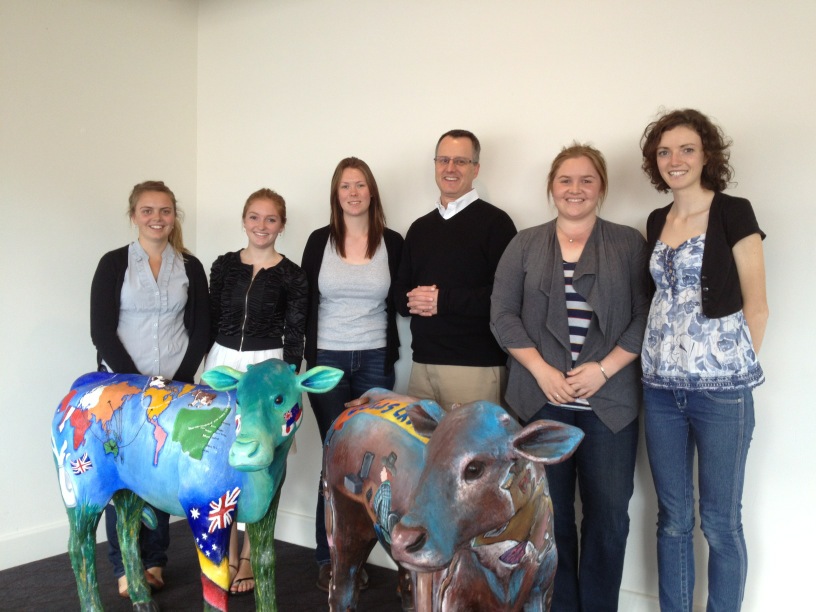While modern farming (like other industries) has been greatly aided by technology, research and development, many consumers feel disengaged with these practices and do not recognise the modern farm as aligning with their minds-eye view of how a farm looks and/or operates. Bridging the gap between these mental images and the realities of the modern farming practices (be it cropping or animal production) was central to recent NSW Department of Primary Industry (DPI) seminars attended by the Poultry CRC‘s Communication Officer.
Charlie Arnot, CEO of the Center for Food Integrity (CFI) and President of CMA (a consulting company) in the United States, is currently in Australia for the Australasian-Pacific Extension National Forum. CFI’s work is aimed squarely at equipping people in today’s food production system (e.g. farmers) with the skills and messages they need to effectively communicate with consumers on issues of concern. For those unfamiliar with CFI and Charlies work , I would encourage you to search YouTube or Google (etc). There is a number of freely available presentations by Charlie covering the topics below.
This is particularly poignant for the poultry industry, as many media articles focus on negative aspects of production. The poultry industry must look at promoting positive and favourable aspects of our industry, and engage consumers in a transparent and honest manner to build trust in what we do.
VIPs Building Trust in Agriculture
This workshop featured Charlie Arnot and Mr James Kellaway, Managing Director of Australian Egg Corporation Limited (AECL). Charlie’s presentation, “Lost in Translation – Learning to speak consumer in a way that builds trust in agriculture” gave a snapshot of the Centre for Food Integrity’s approach in addressing consumer concerns relating to modern farming practices. Many of the same issues that we are dealing with in Australia such as animal welfare, antibiotic use, environmental impacts, chemical use, worker safety, farm profitability and food security to meet the expected world demand for food into the future were discussed.
James Kellaway’s presentation, “Fight or Flight – The egg industry’s experience in building consumer relations” reflected on how the egg industry decides which industry issues to defend and which ones to move away from. With the egg industry at the forefront of the animal welfare debate in Australia, James gave an invaluable insight into the experiences of the egg industry in building trust and confidence with its consumers. Indeed, AECL has been a two time winner of the International Egg Commission’s Golden Egg Award for the country with the best egg marketing, promotion and results.
Future Focussed – Young Australians Building Trust and Confidence in Agriculture
This two-day seminar featured a number of bright, young, up and coming agricultural champions (‘agvocates’), along with seasoned media and industry representatives. In a similar vein to the VIPs workshop this seminar concentrated on concerns raised by some consumer groups about the modern food production system.
Presenters included;
- Charlie Arnot (CFI),
- Greg Mills (NSW DPI),
- Lynne Strong (National Program Director, Art4Agriculture),
- Samantha Townsend (Daily Telegraph),
- Hollie Baillieu (Chair Young Farmers Council, NSW Farmers),
- Jacqueline Baptista (Year of the Farmer),
- Melissa Henry (Young Farming Champion),
- Danica Leys (AgChatOz),
- Crystal Young (Alberta, Canada; passionate agvocate ‘crystalcattle’),
- Marian Macdonald (passionate agvocate ‘milkmaidmarian’), and
- Neil Inall (Agricultural Commentator, Board member at Rural Enablers and Farming Consultant).
To find out more about these highly motivational and thought provoking agvocates please click on their links above. These young (and one or two older) champions have a real passion and belief in what they do, and share a passion for getting the message out to the wider community of the importance of what they do. Many presentations focussed on the need to show consumers what farmers do day-in day-out, and that a balanced approach to animal production can be ethically grounded, scientifically verified and economically viable (as pictured by CMA consulting below).

The big take-home message from these two seminars is the need to communicate to consumers that farmers share similar values, and want to do what is right. The bombardment of consumers with technical detail or baffling science does little to instil confidence in modern farming techniques. People may not want to know the details of the system, but are more interested in the reasoning behind a certain technique or technology, explained in a non-technical fashion. As Charlie Arnot emphasised when attempting to build trust with consumers, “Value similarity (or confidence) is three to five times more important in trust building than competence (science, technology, skills). Consumers must be made aware that farmers share many values with them, especially when it comes to their animals; not only for greatest ROI, but it is the right thing to do.”


